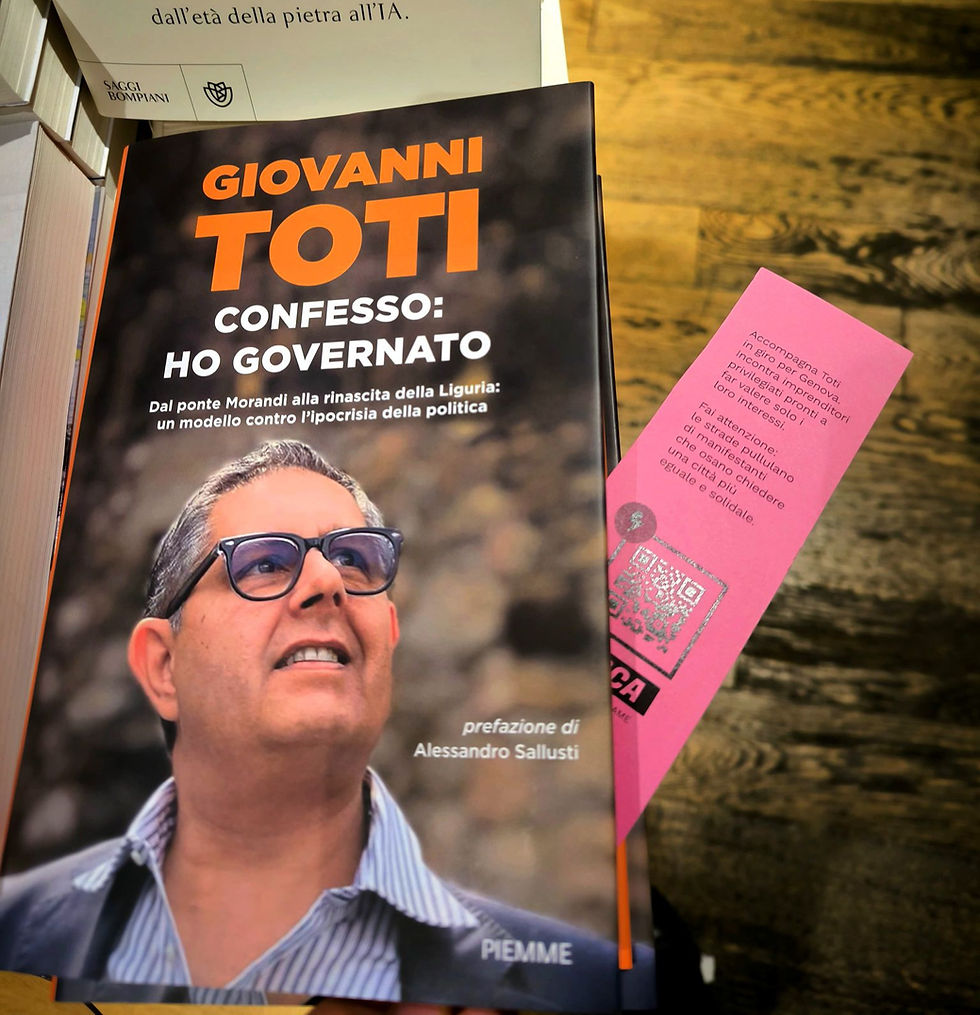Gaming for Change: How Italian activists used playfulness to fight entrenched corruption in Liguria
- Nov 28, 2024
- 4 min read
Creative activism can reignite engagement. Read on to learn how Italian activist organisation Genova Che Osa created a campaign around a video game–proving that humorous tactics can inspire and mobilise new people.

Political campaigns often struggle to engage people who are not already politically active, even when the outcome of political processes directly affects their lives. Quirky, alternative tactics are a great way to draw more people into your campaign and effectively combat political apathy. A key strategy here is to create moments of light-hearted political action that – importantly – meet people where they are. Interactive, fun campaigns foster connection and build community, replacing apathy and despair with hope and collective action.
Interactive, fun campaigns foster connection and build community, replacing apathy and despair with hope and collective action.
A great example of this – which we would like to highlight here to inspire you – is a recent grassroots campaign that was organised by the Italian activist group Genova Che Osa ("Genoa That Dares"). Genova Che Osa is an organisation committed to combating inequalities, promoting solidarity and mobilising marginalised groups in the Italian city of Genoa, while at the same time aiming to influence politics in the broader context of Liguria – the coastal region in northwestern Italy of which Genoa is the regional capital.
This campaign targeted the former regional president: Giovanni Toti, a former journalist turned politician. Toti held the presidency for nearly a decade, despite being heavily criticised for prioritising the interests of the wealthy few over those of ordinary people – facilitating the growth in prosperity of a small group of local businessmen, whose interests he would protect by granting favourable decisions (port terminal contracts, building permits, beach concessions) in return for substantial financial support.
“I confess, I governed”
In May 2024, Toti was placed under house arrest as part of a corruption investigation led by the Genoa Anti-Mafia Directorate and the Guardia di Finanza, a militarised police force responsible for dealing with financial crime.
The investigation centred on allegations that Toti accepted over €70,000 from a businessman, in exchange for favourable decisions. The activists at Genova Che Osa responded immediately and adequately –– within days they had organised a demonstration in Genoa. They launched a petition demanding Toti’s resignation which garnered over 35.000 signatures, they put together a mass letter campaign which resulted in more than 150.000 letters being sent to regional council members, urging them to take action against the alleged corruption and restore integrity in the governance of Liguria. GCO also organised various types of offline protests, from sit-ins to flash mobs. On July 26th, Toti resigned. He accepted a plea-bargain in the corruption case.
Snap elections were announced for October 2024, providing an opportunity for Genova Che Osa to come up with a campaign that required more planning –– and they used this time well. Toti himself, meanwhile, also decided to use his time well: while under house arrest, he finished a book about his political career called “I confess, I governed” –– non-ironically championing democracy and renouncing hypocrisy in Italian politics. It was published in mid-October.

Around the time when Toti’s book came out, however, Genova Che Osa launched their own project: an online mini-game, called Trappola per Toti ("Trap for Toti" – a play on words, because the Italian term for mouse trap is Trappola per topi). Activists from Genova Che Osa visited bookstores in Genoa and discreetly hid bookmarks containing a QR code inside displayed copies of Toti's book – leading readers to their free game online. They further utilised their official website and social media accounts to share the game, encouraging participation amongst progressives.
Rallying cry for progressives
Through simple but engaging 2D-gameplay, Trappola per Toti makes the systemic problems under Toti easily understandable. The main character Toti has to repeatedly jump over ordinary people (sporting protest signs), while trying to make as many deals with businessmen as possible along the way. The game thus turns a complex issue into an accessible, interactive story –– sparking curiosity and spreading awareness in a playful manner. While Toti did not run again in the October election, his political legacy and the centre-right coalition he represented were still in play. By drawing attention to Toti's governance failures, the campaign around this game sought to weaken the appeal of Toti’s allies and their centre-right agenda. It functioned as a rallying cry for progressive voters in the region, encouraging them to go out and vote.

While the election ended narrowly securing a victory for centre-right candidate Marco Bucci, the Mayor of Genoa, the results were very close: centre-left candidate Andrea Orlando received 47,4%, against centre-right Bucci’s 48,8%. This slender margin of victory highlights a newly competitive political landscape in Liguria––with a significant rise in support for the left, signalling a hunger for change.
The challenges that Genova Che Osa face in Liguria are similar to those faced by progressives everywhere at this moment in time: battling corruption, bridging inequality and inspiring citizens to reclaim their democracies. The resignation of Giovanni Toti, and the significant rise of progressive voters that were mobilised ahead of the Ligurian election, are proof that when people are informed and inspired in a way that resonates with them, they end up demanding better. Combining humour, ingenuity, and activism, Genova Che Osa show us that even entrenched systems can be challenged–and changed.
Whether it’s designing a powerful video game or other alternative digital-first tactics, we’re here to help progressives expand their reach and impact. Click here to connect with us, or drop us an email at info@centerfordigitalaction.eu.
For further reading:



Comments